Change in Progress, Botshabelo camp 2015
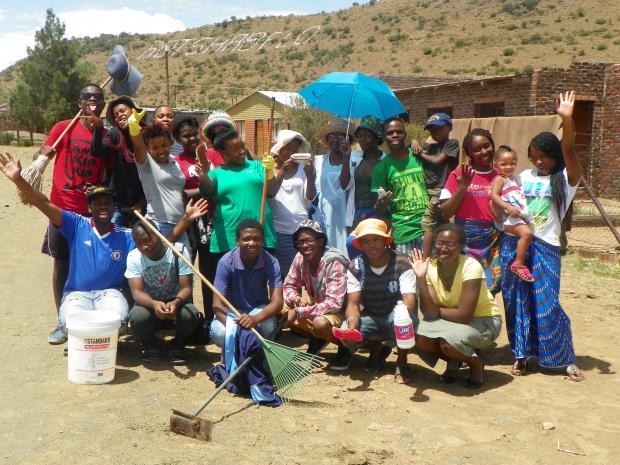
The third Change in Progress (CiP) camp was an energetic and lively event. The first five days of intensive training began on 4 December at a camp site at Golden Gate National Park in the eastern Free State province, Johannesburg, South Africa.
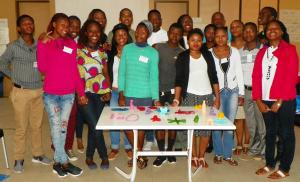 The participants were 14 young people between the ages of 18-25 years - six from Zimbabwe and eight from South Africa. The aim was to equip the youth to lead a moral and visionary-based lifestyle. They started their journey of self-discovery beginning with change within themselves and seeing how to apply it in their community and the world. The training was guided by a team of two facilitators, three guest speakers and four mentors. Participants built a circle of trust, learning, support and deep bonds of friendship.
The participants were 14 young people between the ages of 18-25 years - six from Zimbabwe and eight from South Africa. The aim was to equip the youth to lead a moral and visionary-based lifestyle. They started their journey of self-discovery beginning with change within themselves and seeing how to apply it in their community and the world. The training was guided by a team of two facilitators, three guest speakers and four mentors. Participants built a circle of trust, learning, support and deep bonds of friendship.
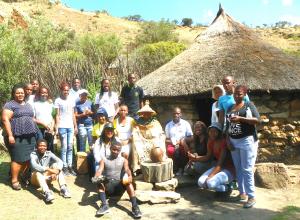 There was a common feeling of excitement, appreciation and care amongst the Zimbabwean and South African participants as they taught each other indigenous games and informed one another about their culture and food. Zimbabwean Tafadzwa Heath Sedeya shared as we walked around a Basotho village, where we had an excursion to learn the history of the Basotho people, 'I never thought that the Basotho people and "us", the Shona, have so much in common. I am grateful for having attended this camp because it reinforced in me the importance of applying the four absolute moral standards in all situations of my life.'
There was a common feeling of excitement, appreciation and care amongst the Zimbabwean and South African participants as they taught each other indigenous games and informed one another about their culture and food. Zimbabwean Tafadzwa Heath Sedeya shared as we walked around a Basotho village, where we had an excursion to learn the history of the Basotho people, 'I never thought that the Basotho people and "us", the Shona, have so much in common. I am grateful for having attended this camp because it reinforced in me the importance of applying the four absolute moral standards in all situations of my life.'
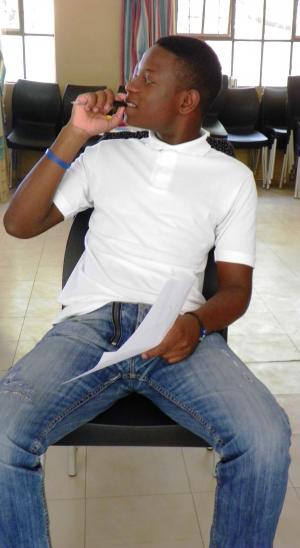 Another Zimbabwean, Tanaka Mhunduru said, 'This camp was an eye opener. I have been spiritually renewed.'
Another Zimbabwean, Tanaka Mhunduru said, 'This camp was an eye opener. I have been spiritually renewed.'
Story telling was part of the camp programme. 'I kept a lot of things to myself because I thought people do not care,' said South African, Mmone Molefe. 'However, since I became part of CiP, I started communicating with other people as a leader and now I can share my story ... Now I know the purpose of life and can help other people to make this world a better place starting with my community.' Boitumelo said 'the camp was an introspection period for me, I did not know anything about reflection, I didn't have values that guide my life, and believed my behaviour was good. I hold close to my heart the skills of reflection and the new family I have made with Change in Progress'.
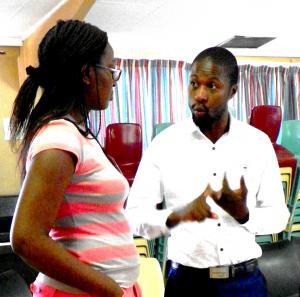 The Art of Leadership session opened another avenue on the journey of self-discovery when exploring the values of a leader. 'Leadership is action and not a position. I am a leader and not a follower of my life,' shared the presenter Moeketsi Komane, a provincial coordinator at Botshabelo Love life centre, and founder of Inguqu Communications.
The Art of Leadership session opened another avenue on the journey of self-discovery when exploring the values of a leader. 'Leadership is action and not a position. I am a leader and not a follower of my life,' shared the presenter Moeketsi Komane, a provincial coordinator at Botshabelo Love life centre, and founder of Inguqu Communications.
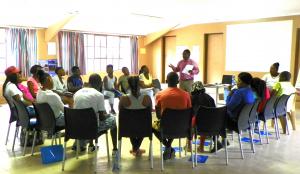
Another speaker was Jimmy Mooko. He started his journey as an entrepreneur in 1983, selling vegetables to his community. His philosophy of entrepreneurship is simple. 'Answer the need of the needy, be passionate and be driven by lessons learned from past experiences.' Mr Mooko is today a renowned businessman and role model in Botshabelo and member of the Bloemfontein Chamber of Commerce and Industry.
Part two of the programme took place in the form of outreach from 9-15 December in the town of Botshabelo, 40 kms east of Bloemfontein. The aim of this was to put into practice the skills developed at the camp, working alongside the community and some Non Governmental Organisations.
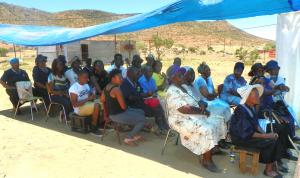 We kicked off the outreach programme by having a conversation with the elders from two old age organisations named Lesedi la ditjhaba and Relesedi Community Centre. We engaged in topics such as gangsterism, teenage pregnancy and the importance of education.
We kicked off the outreach programme by having a conversation with the elders from two old age organisations named Lesedi la ditjhaba and Relesedi Community Centre. We engaged in topics such as gangsterism, teenage pregnancy and the importance of education.
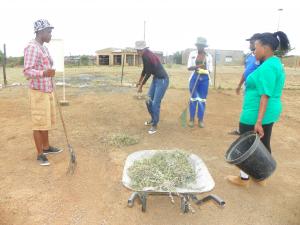
We had time for reflection on issues we ourselves encounter in our communities such as anger, pride and fear. Participants learned the skills to lead a reflection time and share turning points in their own lives. We had the opportunity to help in a very practical way, cleaning carpets, shaping the gardens and raking the yard at Rebohlokoa Day Care Centre that cares for 58 children between the ages of one and five years.
We met at the Botshabelo Love life centre with 22 young people residing in Botshabelo and ran workshops on self awareness, reflection, decision making and conflict resolution.
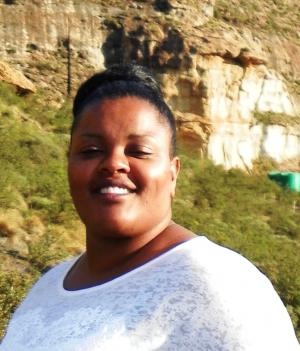 One of the organisers and facilitators, Cleopadia Mohlaodi, felt that the coalition between the Zimbabwean and South African participants had heightened an awareness of the need to respect the qualities and humanity in each of us, and not be identified by our country. She felt that the safe space created together at the camp enabled a dialogue which led to an understanding of the causes of Xenophobic attacks. She really appreciated working together with the youth from South Africa and Zimbabwe and hopes this can be an ongoing relationship.
One of the organisers and facilitators, Cleopadia Mohlaodi, felt that the coalition between the Zimbabwean and South African participants had heightened an awareness of the need to respect the qualities and humanity in each of us, and not be identified by our country. She felt that the safe space created together at the camp enabled a dialogue which led to an understanding of the causes of Xenophobic attacks. She really appreciated working together with the youth from South Africa and Zimbabwe and hopes this can be an ongoing relationship.
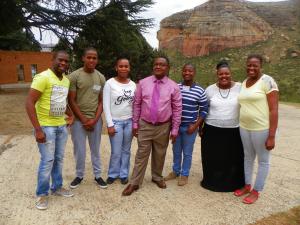 As transformative as the camp was for participants, the four mentors, two from the first camp and two from the second camp, also felt that the time was enriching even for them. Thapelo shared 'I do not open up easily to people I have not shared time with, I am proud of myself because being a mentor made me challenge myself and I love the new me, I want to continue volunteerig with Change in Progress as it helps my growth, and I care for others simaltenously. Moleboheng Molefe, said, 'Story sharing is part of a healing process. You release, you share something verbally. Lack of forgiveness holds one back. When you forgive someone you move from being a victim to being a victor. A leader is someone who is willing to take risks.' Karabo said 'I came to assist Change in Progress and it empowered me with conflict resolution skills. This skill is most needed in my life now because I need to see better communication with my family, and who else but me should start the proccess?' Thank you Change in Progress.
As transformative as the camp was for participants, the four mentors, two from the first camp and two from the second camp, also felt that the time was enriching even for them. Thapelo shared 'I do not open up easily to people I have not shared time with, I am proud of myself because being a mentor made me challenge myself and I love the new me, I want to continue volunteerig with Change in Progress as it helps my growth, and I care for others simaltenously. Moleboheng Molefe, said, 'Story sharing is part of a healing process. You release, you share something verbally. Lack of forgiveness holds one back. When you forgive someone you move from being a victim to being a victor. A leader is someone who is willing to take risks.' Karabo said 'I came to assist Change in Progress and it empowered me with conflict resolution skills. This skill is most needed in my life now because I need to see better communication with my family, and who else but me should start the proccess?' Thank you Change in Progress.
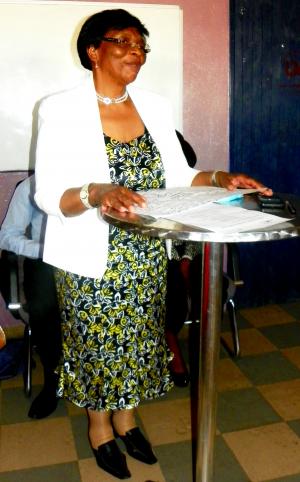 The final day in Botshabelo was a graduation and farewell ceremony for the participants, attended by some of the parents, NGO leaders, plus guest of honour and speaker, Dr Lillian Cingo from South Africa. She is a specialist in Neuro Surgical nursing. She also has a Master’s degree in Counselling Psychology and she is one of the 21 Icons in South Africa, awarded to her for her part initiating and managing the Phelophepha Health train, offering basic health services to the poorest villages of South Africa. During her address Dr Cingo shared that meeting Initiatives of Change, and the challenge to live by moral standards (of honesty, love, unselfishness and purity) guided her life and the choices she made. Her challenge to all of us is that we must be mentally, physically and emotionally healthy in order to proceed as the future leaders. Change has consequences, she said, just as in life there will be consequences for everything, but always remember to have Ubuntu, because no man is an island. We need each other. 'As you graduate today,' she concluded, 'go out there and shine, let nothing stop you.
The final day in Botshabelo was a graduation and farewell ceremony for the participants, attended by some of the parents, NGO leaders, plus guest of honour and speaker, Dr Lillian Cingo from South Africa. She is a specialist in Neuro Surgical nursing. She also has a Master’s degree in Counselling Psychology and she is one of the 21 Icons in South Africa, awarded to her for her part initiating and managing the Phelophepha Health train, offering basic health services to the poorest villages of South Africa. During her address Dr Cingo shared that meeting Initiatives of Change, and the challenge to live by moral standards (of honesty, love, unselfishness and purity) guided her life and the choices she made. Her challenge to all of us is that we must be mentally, physically and emotionally healthy in order to proceed as the future leaders. Change has consequences, she said, just as in life there will be consequences for everything, but always remember to have Ubuntu, because no man is an island. We need each other. 'As you graduate today,' she concluded, 'go out there and shine, let nothing stop you.
Report by Cleopadia Mohlaodi,Victor Nyanhete, Karabo Radebe, Moleboheng Molefe, Thapelo Ramphele and Jerry Chabane


